Intel Core i9 14900K
Rated: 7/10
Intel Core i7 13700KF
Rated: 8/10
Pros & Cons
| Processor | Pros | Cons |
|---|---|---|
| Intel Core i9 14900K | ✅ Overall slightly gaming performance ✅ Higher core count | ❌Very similar to its predecessor without any meaningful improvements ❌Higher power draw than its predecessor on average |
| Intel Core i7 13700KF | ✅Lower power draw than i9 14900K ✅Significantly lower price tag | ❌A year older as it belongs to last generation unlike i9 14900K ❌Omission of integrated graphics |
- There was a small 4.5% advantage in performance for the Core i9 14900K in our gaming tests, and it also performed significantly better in productivity tests than the i7 13700K.
- The power consumption of the Core i9 14900K was around 9.2% greater than the Core i7 13700KF, which contained the streak of Intel’s bad power efficiency.
- There is a price. difference of around 53% between the Core i9 14900K and the Core i7 13700KF.
- For most people, the slightly better gaming performance of the Core i9 14900K does not justify its much higher price tag, especially but the productivity aspect can change that.
Comparison Table
| Processor | Intel Core i7 13700KF | Intel Core i9 14900K |
|---|---|---|
| Processor Graphics | - | Intel UHD Graphics 770 |
| ECC | Yes | Yes |
| PCIe Version | 5 | 5 |
| PCIe Lanes | 20 | 20 |
| TJunction Mac | 95 °C | 100 °C |
| Socket | LGA 1700 | LGA 1700 |
| Best Motherboards | Best Motherboards For i7-13700KF | Best Motherboards For i9 14900K |
| Best Coolers | Best CPU Coolers For i7-13700KF | Best CPU Coolers For i9 14900K |
| Best RAM | - | Best RAM For i9 14900K |
Architectural Difference
- Process Node: Intel stuck with the same 10nm processing nodes for its 14th generation processors as it used in its 13th generation chips, meaning both processors of our comparison today have the same processing nodes.
- Core Count: The Core i9 14900K has a significant advantage over its competitor in core count, with 8 performance and 16 efficiency cores. In contrast, the 13700KF has 8 performance and 8 efficiency cores. This brings the thread count of the 14900K to 32, while the i7 has 24 threads.
- Clock Speed: The performance cores on the Core i9 have a base clock of 3.2GHz, with a boost of up to 6GHz, while the i7 has a frequency range of 3.4GHz to 5.4GHz.
- L3 Cache: The i9 has a larger 36MB L3 cache, while the i7 is stuck with a slightly smaller 24MB cache.
- Other Differences: There are no integrated graphics on the Core i7 13700KF, while the Core i9 14900K supports Intel’s UHD Graphics 770. Realistically, most people might not count this as a noticeable difference, but the graphics can be handy to use while your GPU is unavailable for whatever reason.
Diminishing returns have become a recurrent theme with every high-end tech release in recent memory. In the Core i9 14900K vs i7 13700KF comparison, we will see if the absolute highest-end processor is worth its increase in price over a midrange option.
Gaming Benchmarks – 1080p
To even out the playing field as much as possible, we have constructed a test bench that only leaves the CPU as the point of failure to let both chips spread their legs. The specifications of this test bench are written below:
Test Bench
- OS – Windows 11
- RAM – XPG Lancer RGB 32GB 7200MT/s DDR5
- Mobo – MSI MAG Z790 Tomohawk DDR5
- SSD – XPG GAMMIX S70 BLADE 2TB NVMe
- CPU Cooler – Arctic Liquid Freezer II 420 – AIO Water Cooler
- PSU – ENERMAX REVOLUTION D.F. X 1050W
- GPU – Asus ROG Strix RTX 4090 OC Edition
Baldur’s Gate 3

- Starting with Baldur’s Gate, our Core i9 14900KF was around 5% faster than the Core i7, with an average framerate of around 155 FPS instead of the 147 FPS of the lower-end processor.
- As for the 1% lows, the i9 had lows for around 132 FPS, while the 13700KF had a framerate of around 127 FPS.
Hogwarts Legacy

- The i9 had an average framerate of around 76 FPS, which was only a few frames off from the 73 FPS average of the Core i7.
- The 1% lows were quite slightly different between the two processors, with the i9 getting minimums of around 50 FPS while the Core i7 dipped to around 45 FPS.
Starfield

- Starfield demanded significant CPU power in our test of it, and the Core i9 shined through this challenge. It had an average framerate of 109 FPS, 13.5% higher than the 96 FPS average of the Core i7.
- The 1% lows bounced around 91 FPS on the 14900K, while the 13700KF hovered around 84 FPS in graphically demanding scenarios.
Cyberpunk 2077: Phantom Liberty

- This game had a less noticeable impact going from the i7 to the i9. The newer chip had an average framerate of 169 FPS, while the Core i7 13700KF managed an average of 164 FPS. This made up a 3% advantage for the 14900K, but it was barely noticeable at these framerates.
- The 1% lows told a similar story, with the Core i9 14900K going down to around 142 FPS in hard-to-render scenes, while the Core i7 13700KF went down to around 137 FPS.
The Last Of Us Part 1

- Even with the resolution set to 1080p, The Last Of Us seemed to be GPU-limited in our testing, with small differences between our two processors. The 14900K had an average framerate of 182 FPS, while the Core i7 13700KF managed an average framerate of 177 FPS. The difference here approached 3% but was not noticeable because of the high framerates.
- The 1% lows of the i7 accumulated some noticeable differences. Its dips to 158 FPS made the game a bit choppy compared to the 168 FPS lows of the 14900K.
Star Wars: Jedi Survivor

- In our Star Wars: Jedi Survivor test, the average framerates of both chips converged closely. The Core i9-14900K achieved a framerate of 163 FPS, while the 13700KF maintained an average of approximately 159 FPS. This resulted in a marginal 2.5% difference between them.
- The 1% lows of the Core i9 14900K came out to be around 150 FPS, while the 13700KF had lows closer to 147 FPS.
Spider-Man Remastered

- In Spider-Man Remastered, the 14900K achieved an average framerate of 156 FPS, surpassing the Core i7 13700KF, which maintained an average framerate of 145 FPS. This marked a difference of approximately 7.6% between the two processors.
- The 1% lows were around 128 FPS on the newer processor, while the 13th-gen chip had dipped to around 123 FPS, making the gameplay slightly more stuttery.
Watch Dogs: Legion

A Plague Tale: Requiem

- The performance gap between the two chips was practically negligible in A Plague Tale: Requiem. The Core i9 14900K achieved an average framerate of 150 FPS, while the Core i7 13700KF trailed slightly with an average of 148 FPS, resulting in a minimal difference of around 1.35%.
- The 1% lows brought a bit more diversity, with the 14900K going down to around 137 FPS, while the 13th-gen processor managed dips to around 133 FPS.
Assassin’s Creed Valhalla

- Finally, the last game of our testing showed the Core i9 14900K to have a lead of 4.2% over the 13700KF, with an average framerate of 197 FPS against the 189 FPS of its competitor.
- The 1% lows of the 14900K were around 164 FPS in this game, significantly higher than the 148 FPS minimums of the Core i7 13700KF.
Productivity
Coming to the productivity scores, we ran a few benchmark tests to analyze the productivity performance of each of the two CPUs.
PassMark
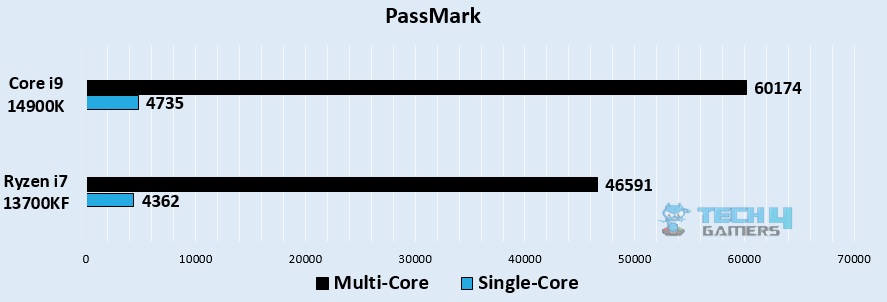
- In the single-thread tests, the i9 14900K had a score of 4735, while the i7 13700KF performed up to a score of 4362. The difference was of 8.2%.
- Regarding the multi-core performance, the i9 14900K was ahead by 25.4% with a score of 60174. While the i7 13700KF only had 46591 points.
CineBench R23
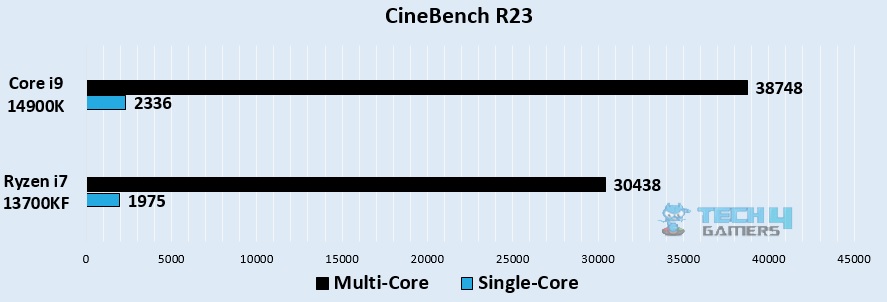
- In this benchmark, the i9 14900K bagged 2336 points. However, the i7 13700KF stayed behind by 16.7% with a total of 1975.
- The multi-core tests show i9 14900K with 38748 points. Once again, the i7 13700K had only 30438 points.
GeekBench v6
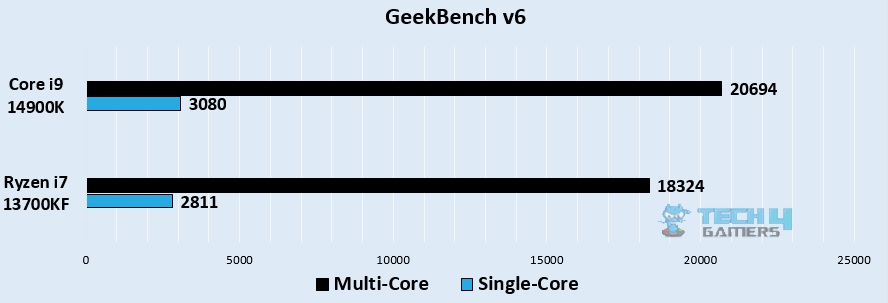
- The i9 14900K led the race by 9.1% with 3080 points, as the i7 13700K scored 2811.
- For the multi-core benchmark, the i9 14900K had a total of 20694, but the i7 13700K could only score 18324, trailing by 12.1%.
Overall Gaming Performance
| Processor | Average FPS | 1% Lows | Productivity (Rating) |
|---|---|---|---|
| Core i9 14900K | 📈153 | 📉128 | ✏️9/10 |
| Core i7 13700KF | 📈146 | 📉122 | ✏️7.4/10 |
| Winner: Core i9 14900K |
Average Framerate
There was only a 4.5% difference between the performance of these chips on average, with the i9 getting an overall average framerate of 153 FPS, while the 13700KF had an average of 146 FPS. For most people, this difference will go largely unnoticed, especially if you are playing at a higher resolution.
1% Lows
The minimum framerates of these chips had a slightly larger delta, with the 14900K giving a 5.5% higher framerate at around 128 FPS, while the 13700KF had lows at around 122 FPS on average.
Overall Productivity
For an overview, the i9 14900K emerged at the top of all benchmark tests we conducted, whether in single-core or multi-core performance.
The extra cores of the Core i9 14900K do not perform great in gaming workloads, but productivity is another story. The new i9 performs around 35% better in the Cinebench 2024 multicore test, which is something to keep in mind if you intend to use these processors for anything more than gaming.
– Shehryar Khan
Gaming Power Consumption
| Game | Core i9 14900K(W) | Core i7 13700KF(W) |
|---|---|---|
| Baldur's Gate 3 | 543 | 482 |
| Hogwarts Legacy | 466 | 444 |
| Starfield | 603 | 534 |
| Cyperpunk 2077: Phantom Liberty | 633 | 563 |
| The Last Of Us Part 1 | 655 | 614 |
| Star Wars Jedi: Survivor | 574 | 513 |
| Spider-Man Remastered | 506 | 463 |
| A Plague Tale: Requiem | 560 | 537 |
| Assassin's Creed Mirage | 501 | 455 |
| Watch Dogs Legion | 546 | 509 |
| Average Power Consumption | 559 | 511 |
| Winner: Intel's Core i7 13700KF | ||
Our measurements of the total system power draw using both processors show a difference of 9.2% between the power consumption of these two CPUs, making the Core i9 14900K less power-efficient than the chip from the last generation. This is a disappointment as the power efficiency of Intel chips has not improved for the last few generations.
Price And Value
| Processor | MSRP | Current Price |
|---|---|---|
| Core i7 13700KF | 💲384 | 💲351 |
| Core i9 14900K | 💲589 | 💲549 |
| Difference | 53% | 56% |
In our opinion, the price of both processors, both the one at launch and what you can currently get it for, is rather steep. There has been a price cut to the 14900K since its launch, but its price-to-performance ratio is still bad, considering only gaming workloads.
Our search of the internet came up with the 13700KF’s price falling only slightly lower than what it was being sold at launch, which is also a disappointment.
Core i9 14900K Vs i7 13700KF: What We Recommend
Core i9 14900K: Intel’s newest high-end processor has some benefits and some weaknesses. It possesses much power for CPU-demanding professional workloads, but gaming is not its strong suit.
Getting this chip to play games does not make sense for most people unless you want as much power as possible, and price is not a problem. The high price and its minimal performance improvements over the last generation force us to recommend people avoid this processor.
Core i7 13700KF: Despite the relatively high price of this processor compared to its launch MSRP, the Core i7 13700KF does give you more bang for your buck for gaming scenarios. You’d be hard-pressed to notice the difference between this processor and its competitor at resolutions higher than 1080p, so we recommend the 13700KF over the 14900K.
The most noticeable pitfall you might encounter with the 13700KF processor is its lack of integrated graphics, which should not be an issue if you have a reliable graphics card. To cap this comparison off, the Core i9 14900K certainly provides more power than the Core i7 13700KF in both gaming and productivity, but its much higher price tag undercuts its advantages.
Frequently Asked Questions
As the Core i9 14900K is the highest-end processor from Intel, it is reasonable to assume that it would go well with the RTX 4090 if you’re planning to game at 4k, but anything above an RTX 3080 would suffice.
The i9 14900K delivers greater speed and performs better in single-core and multi-core tests than the i7 13700KF, making it the better pick for multi-tasking.
Yes, you can overclock your i9 14900K CPU. However, it will heat up faster than usual after the overclocking process.
The integrated graphics of the Core i9 14900K can be useful for troubleshooting problems with your graphics card and also for playing some light games at a low resolution.
Both the Core i7 13700K and the Core i7 13700KF are about as close as you can get in terms of performance. Your framerate might be a frame or two higher on the KF, as it allows a bit more power to seep through because of its omission of integrated graphics.
More From Core i9 14900K
Thank you! Please share your positive feedback. 🔋
How could we improve this post? Please Help us. 😔
[Comparisons Expert]
Shehryar Khan, a seasoned PC hardware expert, brings over three years of extensive experience and a deep passion for the world of technology. With a love for building PCs and a genuine enthusiasm for exploring the latest advancements in components, his expertise shines through his work and dedication towards this field. Currently, Shehryar is rocking a custom loop setup for his built.
Get In Touch: shehryar@tech4gamers.com


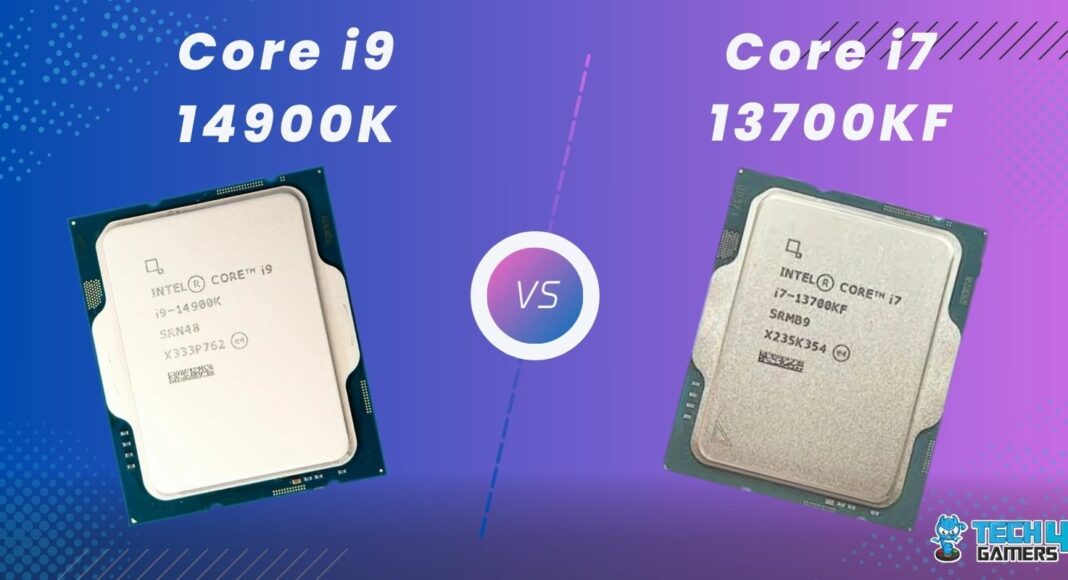
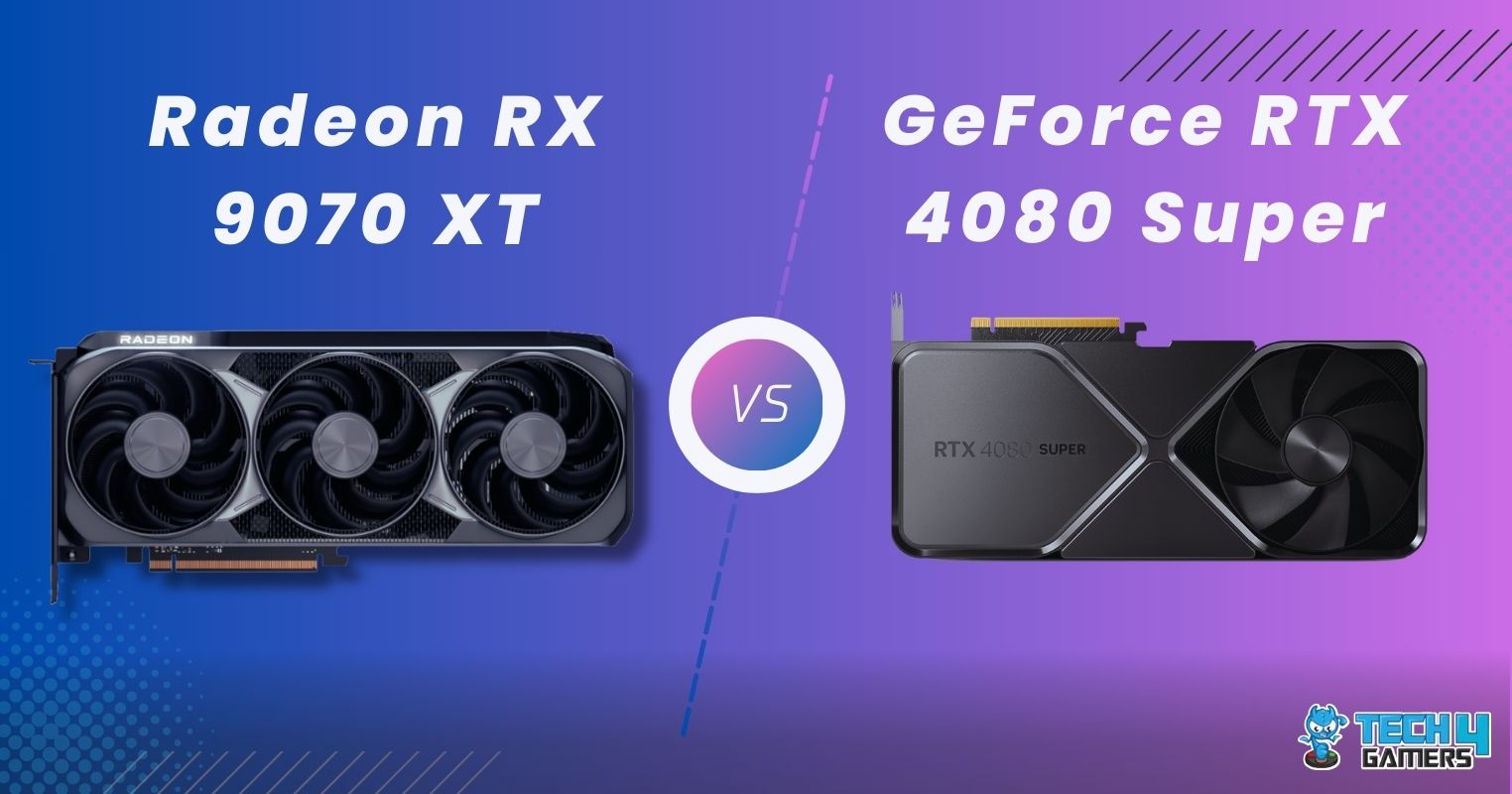
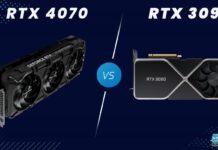
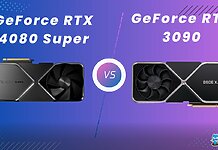
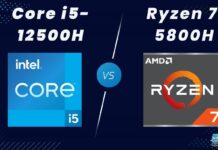
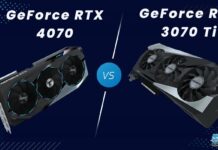
Feedback By:
Adam